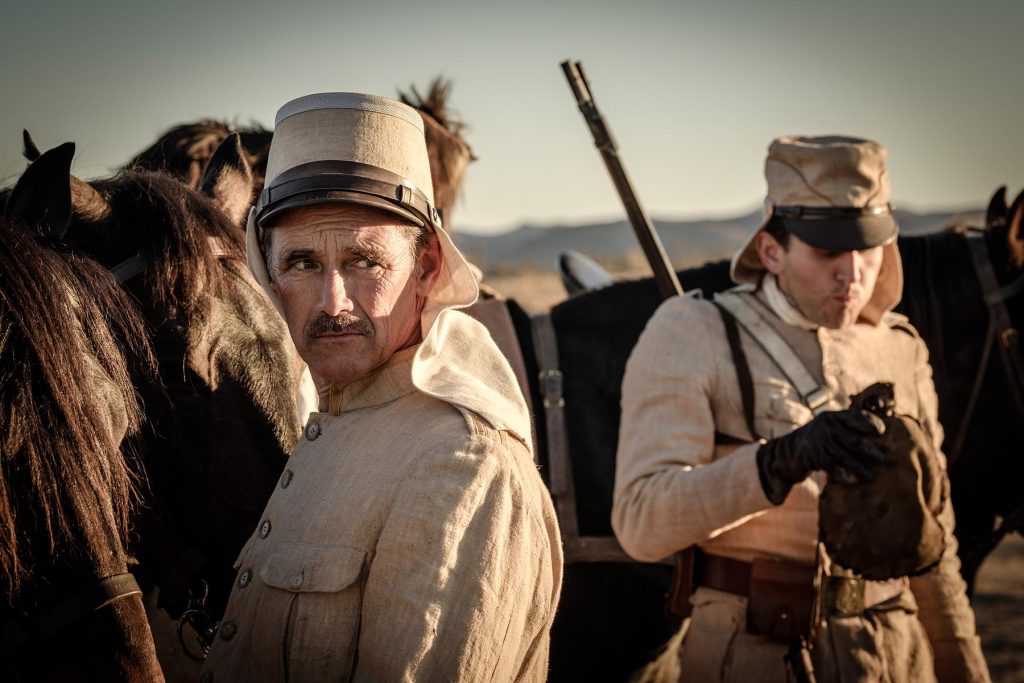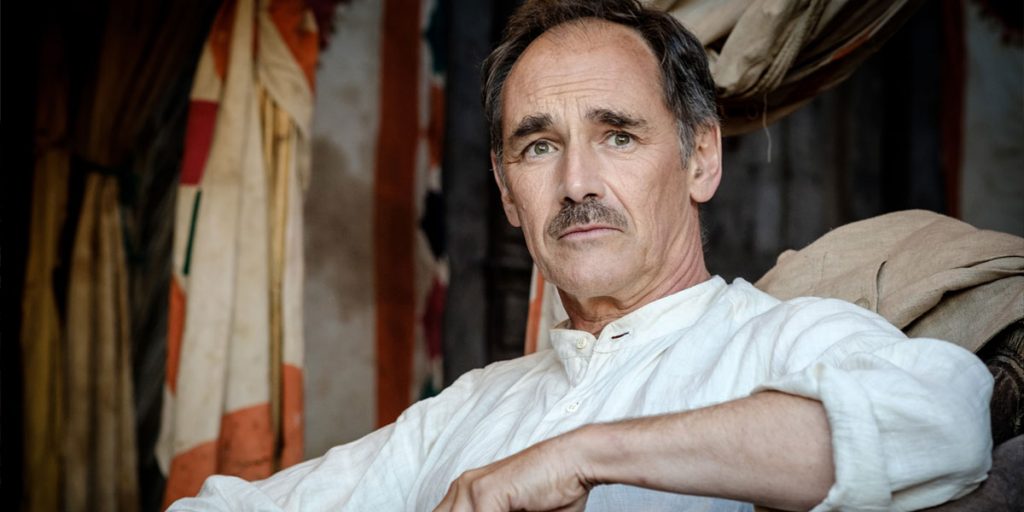Waiting for the Barbarians is a brutally honest allegory of the war, with an exceptional Mark Rylance as the last kind man in an inhumane colonial empire.
If, like me, you’re not familiar with the 2003 novel from which it’s been adapted, Waiting for the Barbarians can make for a puzzling viewing experience, at first. Colombian director/screenwriter Ciro Guerra (Embrace of the Serpent, Birds of Passage)’s first English language film initially appears to be an odd combination of eccentric soldiers with terrible hats, an unfamiliar colonial settlement we struggle to recognize and an important colonial war whose history we can’t quite remember, no matter how hard we try. In fact, our confusion is the result of an intentional choice by South African author – and recipient of the 2003 Nobel Prize in Literature – J.M. Coetzee, who adapted the film’s screenplay from his own novel: Waiting for the Barbarians is set on the border of a deliberately unnamed empire, and serves as an allegory of the war between oppressor and oppressed, and the universal brutality of colonization.
Armed with this piece of information, the film assumes a completely different meaning, and becomes a poignant, emotionally charged drama about war at its most inhumane and purposeless. It doesn’t matter where in the world the action takes place and which war the film refers to, historically speaking: Waiting for the Barbarian could be set anywhere, as it tackles universal, uncomfortable themes that define all conflicts of this kind – the unneeded violence, the loss of humanity, the inability to communicate and the failure to show empathy and compassion to one another right when we need it the most.
At the very core of Waiting for the Barbarians is the only character that appears to have preserved an ounce of humanity. The Magistrate (Mark Rylance) is the administrator of an isolated frontier settlement on the border of an empire, and a profoundly just, empathic man who finds himself having a crisis of conscience when the ruthless Colonel Joll (Johnny Depp) arrives at the settlement. Not long after the two men meet for the first time, the Colonel starts interrogating “barbarians”, with the aim of finding out about their activities and reporting back on the security situation on the border. The Magistrate soon discovers that Joll’s methods of interrogation are violent and cruel, and involve brutally torturing unarmed, harmless, poor people by breaking their bones with a hammer, burning their eyes and committing a series of excessively violent, inhumane acts towards fellow human beings whose only “fault” consists in having been born on what seems to be the wrong side of the conflict.

When the Colonel temporarily leaves the settlement, the Magistrate takes pity upon one of his victims, a “barbarian” woman (“The Girl”, played by Gana Bayarsaikhan) who can barely walk and has been rendered blind after Joll’s treatment. It is from this act of compassion that the film’s main conflict originates, with Officer Mandel (Robert Pattinson) joining the Colonel at the settlement, and both men turning on the Magistrate, first accusing him of fraternising with the enemy, then teasing him for attempting to be the “one just man” and ultimately stripping him of his dignity for daring to show kindness to the enemy.
“We have no enemy that I know of, unless we ourselves are the enemy“, a defeated Magistrate faces his ruthless inquisitors with a powerful statement that encompasses the entire message of the film: in colonial wars, the real “barbarian” is the oppressor, and not the oppressed. As the Colonel cold-bloodedly says, “there is no history, here”: in a war where the winners are the colonizers, there is no room for kindness, sympathy and compassion. Waiting for the Barbarians clearly sends its message across with a slow-paced first half of the film that shows us humanity at its best, with the Magistrate and the Girl building a nuanced, delicate, beautiful bond, followed by a violent, heart-wrenching second half that replaces these moving moments with a harsh dose of reality and no real resolution – after all, there is no meaning to be found in such kinds of war.
Waiting for the Barbarians is a visually impressive film, with exceptional photography and lighting (thanks Academy Award winning cinematographer Chris Menges, of The Reader and The Killing Fields) that give it a distinctive look, often making it resemble a painting. It’s also an incredibly well-acted film, with a superb Mark Rylance that owns our emotions from the very first moment he appears, and excellent performances from Robert Pattinson, Gana Bayarsaikhan and Sam Reid. At the same time, it’s also a film that often lacks rhythm, and that asks you to sit through a very static and detached initial half an hour, and slowly develops into a meaningful drama that only picks up the pace towards the end. Additionally, while Johnny Depp usually elevates any film he’s in, Waiting for the Barbarians is the rare occasion in which his eccentric style of acting (combined with a flawed screenplay) alienates the audience, turning the villain of this story into a quirky caricature with an odd accent that isn’t as memorable as he could have been.
Even with its imperfections, Waiting for the Barbarians remains a compelling watch with a meaningful message, and a display of Mark Rylance’s exceptional skills as a performer. Ciro Guerra’s drama sheds light on the brutality of a war with no real winning side, whose most important loss is that of the fundamental qualities that make us human.
Waiting For The Barbarians is now available to watch on digital and on demand.

